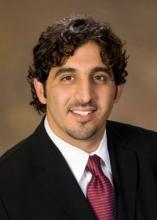Mild traumatic brain injury with intracranial hemorrhage can be safely managed by an acute care surgeon without the need for an inpatient neurosurgical consultation, a retrospective analysis has found.
A study of 270 patients with mild traumatic brain injury and positive CT scan findings of intracranial hemorrhage – 90 of whom received a neurosurgical consultation and 180 of whom did not – found no neurosurgical intervention, in-hospital mortality, or 30-day readmission in either group.
A total of 8% of patients seen by acute care surgeons had a postdischarge visit to the emergency department, compared with 4% of the group who had a neurosurgical consultation (P = .5), according to data published in the July 2013 issue of the Journal of Trauma and Acute Care Surgery (2013;75:102-5 [doi:10.1097/TA.0b013e3182946667]).
The main reasons for the unplanned returns, all of which were within 12 days of initial discharge, were headache (62%) and vomiting (30%); however, all patients in both groups were discharged home from the emergency department.
Patients who saw a neurosurgeon were more likely to have a repeat head CT scan (86% vs. 20%; P less than .001) and ICU admission (44% vs. 20%; P less than .001) for further care and evaluation, compared with patients seen by an acute care surgeon.
Differences in practice also led to differences in cost, as patients in the no neurological consultation group showed significantly lower mean hospital costs than did those in the neurosurgical consultation group ($9,400 vs. $14,108; P = .01).
"Currently, the standard of practice is to consult the neurosurgical service for all head injury patients with intracranial bleeds," wrote Dr. Bellal Joseph and his associates from the University of Arizona, Tucson.
"Our study questions the clinical relevance of a small intracranial hemorrhage on head CT scan in patients who are neurologically intact and adds to the increasing evidence that small intracranial hemorrhages can be managed without obtaining a formal neurosurgical consultation because none of our study patients required a neurosurgical intervention based on the findings of initial head CT scan."
Of the 270 patients involved in the study, 63% were male and the mean age was 39 years. The median Glasgow Coma Scale score was 15 and median head Abbreviated Injury Scale score was 2.
Researchers said the results had already changed the practice at their institution, with acute care surgeons and neurosurgeons collaborating to develop guidelines for neurosurgical consultations in blunt head trauma.
"Based on these guidelines, the acute care surgery team at our institution now independently manages subdural hematoma or epidural hematoma of 4 mm or less as well as solitary subarachnoid hemorrhage and contusions," they reported.
However, the study’s authors said the challenge would be setting a new standard of acute care surgeons being the leading provider of care for patients with mild traumatic brain injury, and that prospective evaluation of strict guidelines could support the change in practice.
The authors declared no conflicts of interest.


